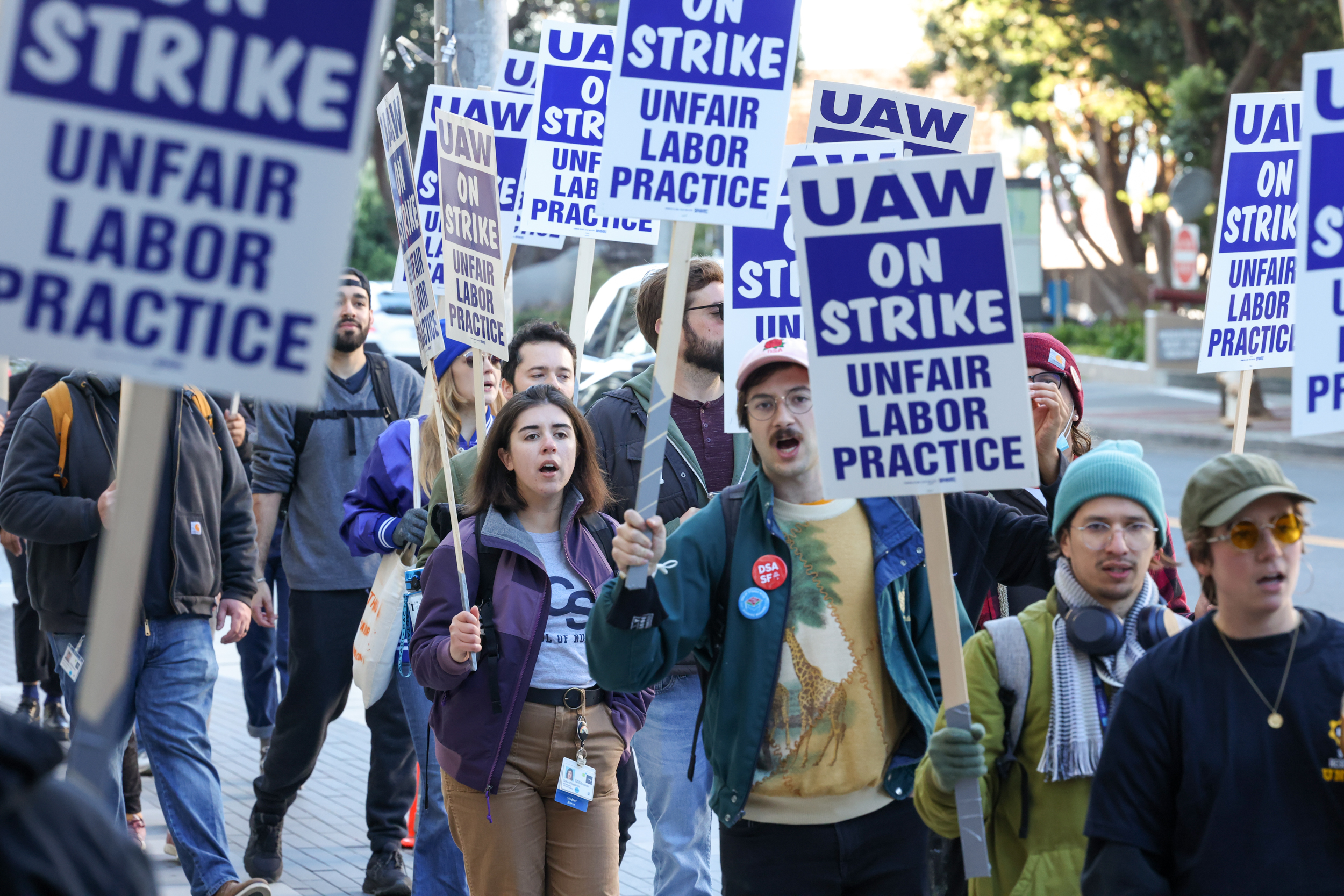The massive strike involving 48,000 University of California academic workers is entering its second month and, with no end in sight, is on course to wreak havoc during finals week, which starts Monday.
“It’s nerve-wracking [going into finals week] not knowing what my grade is,” said Maida Suta, a third-year student at UC Berkeley. As a transfer student with a tight window to declare a major and graduate on time, her future is dependent on getting accurate, timely grades.
Not receiving final grades could also leave students like her in noncompliance with federal requirements for receiving vital financial aid. Students that rely on benefits from the Veterans Affairs department also face a similar problem.
But she, along with many UC students and faculty who are sympathetic to the strike, are stuck between a rock and a hard place. Do they pick up the slack and try to carry on, or do they join the picket line?
Without graduate student instructors and assistants, who often take on the important and cumbersome work of grading and lecturing, the nine campuses across the UC system are scrambling to figure it out.
“I’m all for supporting workers in getting fair wages,” Suta said. “But it’s hard to prepare for finals without some sense of where my grade is. I’m in total limbo.”
“[The college] is trying to weaponize the fate of undergraduates in this conflict,” Berkeley faculty union chair James Vernon said at a recent Sather Gate town hall event—a well known campus landmark. He told his colleagues in attendance that while each professor should make the decision for themselves, that picking up any extra work left behind by the striking workers would set a bad precedent.
“If [the college] wants this to be over, then they should offer a fair contract,” he said.
While the faculty union’s official position is that the members are sympathetic to the cause, they themselves are not on strike. So the classroom experience at the UCs will vary by the course and instructor.
The coalition of teaching assistants, researchers and postdoctoral fellows are represented by the United Auto Workers union, which has called the strike the largest in the history of U.S. higher education. They demand wage increases, better support for working parents and anti-bullying protections, among other benefits.
Some teachers have risked their own pay by withholding work entirely. While others, like Berkeley chemistry professor Ronald Cohen, have opted to continue teaching class.
“The strike has been disruptive to the education of students,” Cohen told The Standard. “Not only because some strikers have removed their labor as teachers, but some are simultaneously students and are not doing their assignments.”
He also pointed to how some strikers have actively interfered with lectures by obstructing entrances to buildings or interrupting with loud noise nearby.
While Cohen understands the financial struggles of living in the Bay Area, he said there are issues the strike action is losing sight of.
One major concern of Cohen’s is that postgraduate students do not have conventional work-hour arrangements and that duties such as academic research are difficult to quantify in relation to a salary or wage.
“I don’t want a supervisor-laborer relationship with Ph.D. students I am mentoring,” Cohen said.
“Having that relationship transformed to supervising ‘work’ is depressing and demoralizing.”
In November, the bargaining bloc of postdoctoral scholars and academic researchers reached a tentative deal with the UC system. But it still leaves 37,000 workers fighting for a better contract.
UC campuses, like Berkeley and Los Angeles, are situated in some of the state’s most expensive housing markets. A union survey found that 40% of graduate-student workers spend more than half of their pay on rent and 92% of them spend more than 30%.
When asked about how the UC system is handling the looming grading crisis, a spokesperson said its campuses “are prepared for alternative methods of instructional delivery,” and they are “prepared for contingencies in the event the strike has any effect on the conclusion of the academic term.”
According to the faculty code of conduct, changes to finals can include format or content changes, take-home exams, asynchronous exams that can be taken at any time or place or no-fault final exams where the final cannot negatively impact a student’s grade.
The latest UC offer to the remaining striking parties was presented on Dec. 7.
Update: On Dec. 9, the University of California announced that United Auto Workers have agreed to enter private mediation with the University. The two sides have agreed on Sacramento Mayor Darrell Steinberg as a neutral third party to help facilitate the bargaining process.
